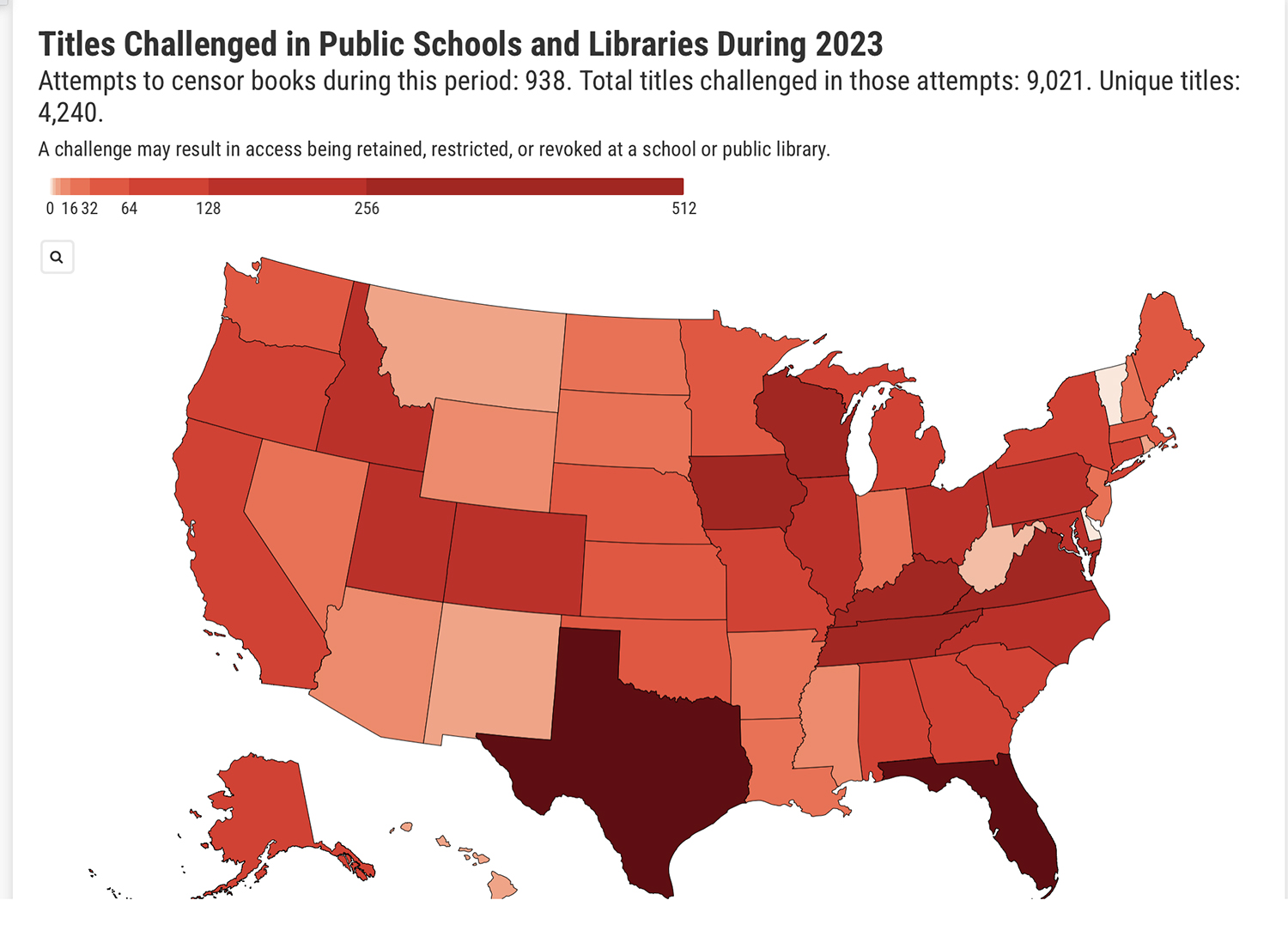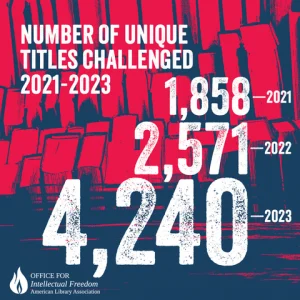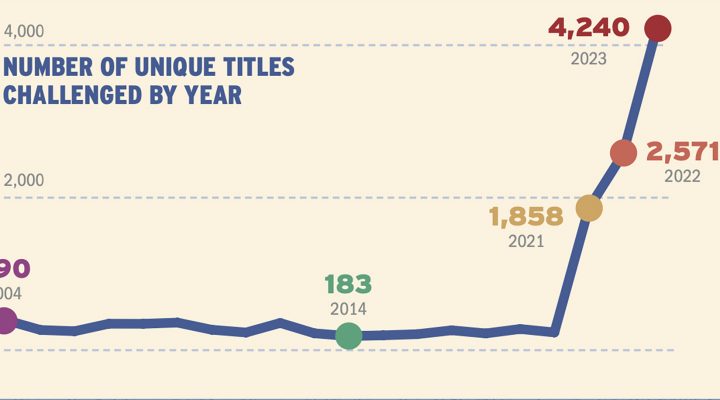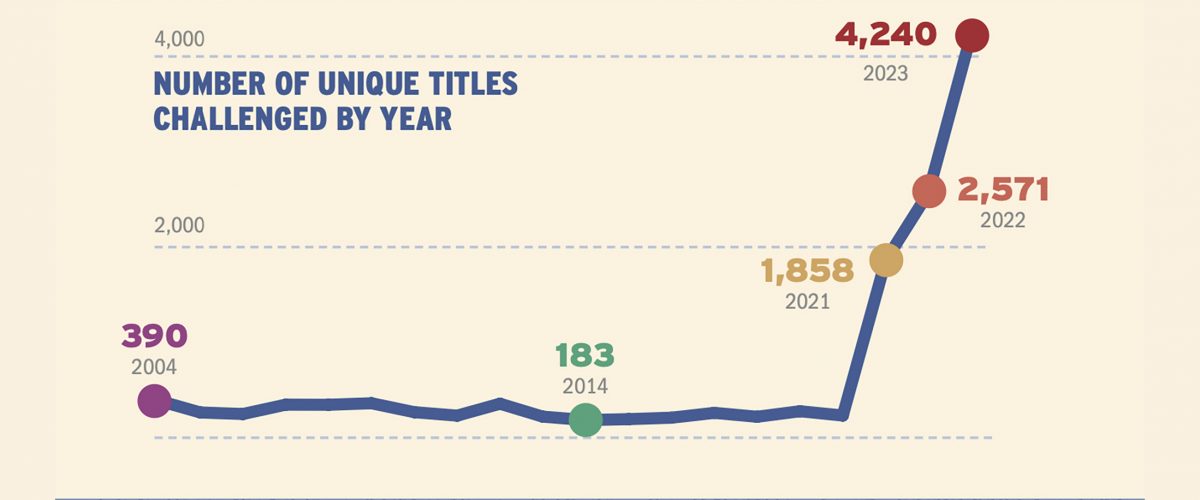Following an unprecedented increase in efforts to ban books, some states are responding by passing laws that make it harder for partisan, ideological or religious groups to remove books from public access in libraries and schools and threaten librarians with jail time.
So far, seven states have passed laws that put limits on national book ban campaigns, according to Book Riot, a media company covering books and publishing. Another handful of states is considering such laws. CNN also has reported on the pushback against book bans.
The new laws are a response to bans orchestrated by conservative Christian activist groups, advocates of parental rights in education and opponents of “woke indoctrination.” One of the most prominent groups behind bans nationwide is Moms for Liberty, which was founded in Florida in 2021 and has chapters nationwide.

Source: American Library Association
2023 saw a record number of efforts to ban books across the country: more than 4,349 bans in 23 states in the second half of the year, said PEN America, a group supporting free expression worldwide. This six-month total surpassed the number of bans in all of 2022, said the 102-year-old organization.
The American Library Association also tracks book bans, most of which involved books on sexuality, gender or race. ALA, which celebrates an annual Banned Books Week, said the number of attempted book bans in 2023 was “the highest levels ever documented” by the 148-year-old group.
 A year ago, Illinois became the first U.S. state to pass a law ending book bans. The law took effect Jan. 1. This month, Colorado became the latest state to ban bans. Bans are also in place in California, Maryland, Minnesota, Vermont and Washington.
A year ago, Illinois became the first U.S. state to pass a law ending book bans. The law took effect Jan. 1. This month, Colorado became the latest state to ban bans. Bans are also in place in California, Maryland, Minnesota, Vermont and Washington.
“Young people shouldn’t be kept from learning about the realities of our world,” said Illinois Gov. J.B. Pritzker. “I want them to become critical thinkers, exposed to ideas that they disagree with, proud of what our nation has overcome, and thoughtful about what comes next.”
Each state law is slightly different, but most require libraries and schools have written collection policies that spell out how they determine which materials to acquire, who has access to controversial materials, and what process people should use to challenge materials.
Colorado’s new law, which covers public libraries, not schools, has a number of key features:
- It lays out a process for reconsidering materials which must be followed;
- People seeking to ban books must live within the service area of the library, which makes it harder for national groups to launch campaigns;
- People seeking to ban books must make their names public, doing away with anonymous requests;
- Libraries must make public the decisions they render when materials are questioned;
- The bill highlights the professional experience of librarians in managing collections and protects them from retaliation.
“I just think it’s so important for kids to be exposed to a wide variety of experiences and perspectives,” said Colorado state Sen. Lisa Cutter. “Libraries help create empathy and understanding. Kids feel isolated when they don’t see themselves in society, but they can see themselves in books and media.”
Meanwhile, some school districts are having second thoughts about the book bans they’ve previously imposed. Two districts in Texas are reconsidering bans after being accused of removing books dealing with racial discrimination, such as To Kill a Mockingbird, and books written by minority authors, including The Color Purple by Alice Walker.
But in Utah, efforts to reverse book bans resulted in even more restrictive bans, according to Book Riot.
Some groups that support book bans say they aren’t really bans, including Moms for Liberty and Focus on the Family, which supports the moms’ group.
Focus claims that using the phrase “book ban” is one of the “ways the media and their allies dodge the real issues and work to push offensive books on children.” Focus says, “This hysteria is fomented by groups like the American Library Association.”
“The not-so-subtle insinuation is that parents who want to safeguard their children are totalitarians — perhaps even hosting weekly book burnings and roasting hotdogs and marshmallows over flaming copies of Gender Queer and All Boys Aren’t Blue!” Focus said in one of its publications.
“Does anyone seriously believe these books are really ‘banned’ — unavailable for purchase or reading in America? Are publishers shut down by goose-stepping police officers? Do we see book warehouses going up in flames from fires set by angry mobs of parents or government officials?”
Related articles:
For the love of literature: How book bans are whitewashing America | Analysis by Laura Ellis
Love, hate and Harry Potter | Opinion by Greg Garrett
Everything you need to know about the rise in efforts to ban books from libraries | Analysis by Mark Wingfield


